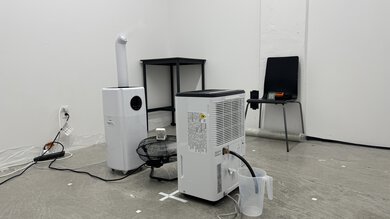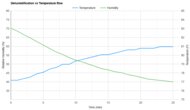A dehumidifier can help clear out moisture in any room in your home, but basements are likely to benefit most, as they can get pretty damp. A couple of features make or break a dehumidifier for basement use. Good dehumidification capacity is a must, as is a wide range of fan speed settings. Drain pumps are another helpful addition, as they eliminate some of the daily maintenance by directing any accumulated moisture to a distant floor drain or sink.
You'll also want to find a model with a good range of fan speed variance. We investigated airflows relation to dehumidification efficiency, and found that running your dehumidifier at a lower fan speed can more efficiently clear moisture in certain situations, while larger rooms benefit from higher fan speeds to effectively circulate air and ensure effective dehumidification. Read about our findings to learn more about how your dehumidifier's fan speed impacts its ability to pull moisture from the air.
We've tested 20 dehumidifiers, and below are our recommendations for the best dehumidifiers for basements. We base our picks on their dehumidification performance, price, and feature sets. For more options, check out our recommendations for the best dehumidifiers, the best small dehumidifiers, and the best dehumidifiers for bedrooms.
Quick Look





If you don't know where to start, deciding between dehumidifiers can put a damper on your day. Luckily, we've streamlined the process, buying and testing 20 dehumidifiers from major retailers; no cherry-picked models. Our lab team then measures airflow, capacity, and more to ensure you have the data you need to make a buying decision. If you're still between models, you can compare them directly, side by side.
For more information, you can visit our About Us page.
-
Best Dehumidifier For Basements
 Basement8.5Capacity8.5Temperature Stability5.3Noise6.2See all our test resultsTested Dehumidification Capacity31.0 PPD (14.7 LPD)
Basement8.5Capacity8.5Temperature Stability5.3Noise6.2See all our test resultsTested Dehumidification Capacity31.0 PPD (14.7 LPD)The best dehumidifier for basements we've tested is the Midea MAD50PS1WS. This 50-pint unit is designed for use in large spaces, so it'll do just fine in open-concept dens. It features a fairly large 1.6 gal (6.0 L) tank, but if you plan on running it for extended periods, it does have a built-in pump and hose, allowing it to drain continuously into a sink or bathtub. Controls and overall functionality are similar to those of the rest of Midea's lineup, featuring Wi-Fi connectivity that allows you to adjust settings using the MSmartHome app on iOS or Android devices, or with voice commands via Alexa or Google Assistant.
This unit has a somewhat limited range of fan speed settings. Airflow at its highest fan speed helps generate air movement in larger open spaces, but its slowest fan speed setting may not be low enough to cool the evaporator coils, which could reduce performance in basements that are especially cool and humid. This unit is also quite noisy, and the noise from its fan can be disruptive if you have it running while watching TV. As is expected for a 50-pint model, it's also rather bulky. The Midea MAD50PS1QWT offers similar performance in a smaller, collapsible form factor, but availability is quite limited.
-
Best Mid-Range Dehumidifier For Basements
 Basement7.6Capacity7.2Temperature Stability7.0Noise6.6See all our test resultsTested Dehumidification Capacity21.0 PPD (9.9 LPD)
Basement7.6Capacity7.2Temperature Stability7.0Noise6.6See all our test resultsTested Dehumidification Capacity21.0 PPD (9.9 LPD)If you're shopping at a mid-range price point and have a smaller basement that doesn't require as big a machine, the Midea MAD35S1QWT is among the best dehumidifiers for basements we've tested. It's outgunned in terms of raw capacity by the Midea MAD50PS1WS above and has a harder time clearing out moisture in large, open-concept dens, although it'll still perform well in medium-sized basements. This device is Wi-Fi enabled, so you can operate it remotely through the MSmartHome smartphone app. You can also use voice commands through Amazon Alexa and Google Home devices. Ensure your basement has reliable Wi-Fi connectivity if you plan to operate it remotely.
This dehumidifier features two fan speeds, which makes it slightly less flexible in varying ambient conditions compared to some alternatives. While its collapsible design saves space when the unit isn't in use, it remains a bulky machine when fully deployed, especially when compared to other 35-pint models. Its 4.2 gal (16.0 L) water bucket gets pretty heavy when filled, too, making it a nuisance to empty. That said, if you'd rather drain it into a sink in a furnace room or a faraway floor drain, you can detach it from its water bucket, hook up a hose to its drain port, and activate the built-in pump. Again, finding this model can be tricky, but it's available from Home Depot. You can also check out the manufacturer's website for an up-to-date list of vendors.
-
Best Budget Dehumidifier For Basements
 Basement6.9Capacity6.1Temperature Stability8.0Noise7.9See all our test resultsTested Dehumidification Capacity6.0 PPD (2.8 LPD)
Basement6.9Capacity6.1Temperature Stability8.0Noise7.9See all our test resultsTested Dehumidification Capacity6.0 PPD (2.8 LPD)Our best budget pick is the Waykar PD160B. This fairly compact model has a relatively small 8.5-pint capacity, so it'll struggle to remove moisture from larger areas, but it's a good option for smaller basements. Additionally, it produces minimal noise, which is ideal if you use your basement as a bedroom, and it generates very little heat. You can set your desired humidity level and let the unit adjust its fan speed automatically, so you don't have to fiddle constantly with the settings while it runs. It lacks a built-in pump to drain the water into an elevated receptacle, but it does have a hose for continuous drainage into a floor drain or similar receptacle. Unfortunately, the display is rather dim, and its poor viewing angles make it almost impossible to read unless you're directly above it.
-
Best Basement Dehumidifier For Small Spaces
 Basement3.6Capacity2.5Temperature Stability8.1Noise8.0See all our test resultsTested Dehumidification Capacity0.4 PPD (0.2 LPD)
Basement3.6Capacity2.5Temperature Stability8.1Noise8.0See all our test resultsTested Dehumidification Capacity0.4 PPD (0.2 LPD)If you only need a dehumidifier to remove moisture from a small space in your basement, such as a storage closet under the stairs, the ProBreeze PB-03 is worth considering. It's a much different proposition than the other, more conventional models on this list; its dehumidification capacity is downright pitiful, even compared to a fairly compact unit like the Waykar PD160B. Of course, it isn't intended for the same purpose—the ProBreeze's highly compact size makes it ideal for tight spaces. If you stick it in an enclosed room or semi-enclosed area, it'll be almost inaudible, as it emits only 44.6 dBA of noise while running. Its heat output is also practically negligible.
This dehumidifier has a very small water tank and lacks a port for continuous drainage. However, since its dehumidification rate is so slow, neither of those things is a significant concern. You'll only really need to empty the tank every week or so, even if you leave it running continuously. Additionally, it shuts off automatically when the tank is full, eliminating the risk of overflow.
Notable Mentions
-
GE APYR50LC:
The GE APYR50LC is a 50-pint dehumidifier. It performs quite similarly to the Midea MAD50PS1WS and has a slightly more compact body. It also has an automatic fan speed adjustment function for differing humidity levels. That said, the Midea is marginally more efficient, makes less noise, and has slightly less impact on a room's ambient temperature.
See our review -
Whirlpool WHAD50PCW:
The Whirlpool WHAD50PCW is a full-size 50-pint dehumidifier. It provides a similar dehumidification capacity to the Midea MAD50PS1WS and offers a wider airflow range. That said, availability is quite limited.
See our review -
GE ADHL35LA:
The GE ADHL35LA is a 35-pint dehumidifier. It's smaller than the Midea MAD35S1QWT and will have a slightly lesser impact on a room's ambient temperature. Its water tank doesn't hold nearly as much water, but it's much easier to empty than the Midea's bucket. The Midea runs quieter, has a built-in drain pump, and features Wi-Fi connectivity.
See our review -
ProBreeze PB-02:
The ProBreeze PB-02 is a compact dehumidifier, even smaller than the ProBreeze PB-03. That said, given the relatively minor difference in size between the two devices, the PB-03 offers noticeably better dehumidification capacity and has a bigger water tank.
See our review
Recent Updates
Nov 07, 2025:
Replaced the Frigidaire FFAP5034W1 with the Midea MAD50PS1WS as the 'Best Dehumidifier For Basements' pick due to current availability.
Apr 15, 2025:
We've made minor updates to the text and checked that the products are in stock, but our recommendations haven't changed.
Mar 17, 2025:
We've edited our text for clarity, and verified our recommendations are available and represent the best choices.
Feb 06, 2025:
Minor in-text adjustments to better convey product details.
Jan 09, 2025:
We've verified that our recommendations are in stock and provided links for products that may not be readily available from major online retailers. We also made small edits throughout for clarity.
All Reviews
Our recommendations above are some of the top basement dehumidifiers for most people. We factor in the price, feedback from our visitors, and availability.
That said, no single best option will suit everybody; your needs will depend on your budget, the size of your basement, your tolerance for operating noise, and whether you like having a device with convenience features like Wi-Fi connectivity or a drain pump. If you'd like to choose for yourself, here's the list of all our dehumidifier reviews.
















